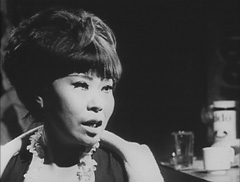Screening in memory of Imamura Shohei
The Documentaries of Imamura Shohei
I won’t hesitate to call documentaries like A Man Vanishes (1967), A History of Postwar Japan as Told by a Bar Hostess (1970) and the Outcast TV show a crucial part of Imamura Shohei’s filmography. This is, however, because Imamura was thoroughly dissatisfied with documentaries.
Imamura said that you “can’t get through to the essence of people with documentaries.” Why is that? Apparently it has something to do with somehow not being able to control people as one wishes, as can be done in fiction. This most simple irritation of Imamura’s is probably best noticeable in A Man Vanishes, when he claims that Mouse (Yoshie) is an actress. In A History of Postwar Japan as Told by a Bar Hostess or in the Outcast shows in the seventies, when he distanced himself from film, Imamura himself appears as interviewer and hurls questions at his subjects. But doesn’t that expose Imamura’s hesitation at being utterly unable to zero in on the core of people? Imamura does not want to discard the question of whether the life of the subject is affected by the filmmaker’s involvement. In that sense Imamura’s documentaries inevitably take on a meta-like structure.
Returning to fiction after a ten-year lapse with Vengeance Is Mine in 1979, this documentary vision of Imamura’s resounded as a basso continuo. It is the closest thing to a “well-made work” in Imamura’s filmography, but in the final scene the much discussed “stop motion” suddenly appears. In this shot the cinematic time is violently interrupted and it skids away from a proper cinematic ending. There, it’s safe to say, we hear the echo of Imamura’s documentaries.
—Kawamura Kenichiro
(Associate Professor, College of Image Arts and Sciences, Ritsumeikan University)
 Imamura Shohei
Imamura Shohei
Born in 1926, Imamura entered the Shochiku Ofuna Studio in 1951, but went to Nikkatsu in 1954. He worked as assistant director on films by directors such as Kawashima Yuzo, and made his directorial debut with Stolen Desire in 1958. He subsequently made a series of much discussed films, including My Second Brother (1959), The Insect Woman (1963), The Pornographers (1966), A Man Vanishes (1967), and The Profound Desire of the Gods (1968). Together with his contemporary Oshima Nagisa, he was the flag bearer of Japanese cinema, earning high acclaim internationally as well. At the Cannes Film Festival he was awarded the Palm d’Or twice, a rare achievement, for The Ballad of Narayama (1983) and The Eel (1997). His other films include Zegen (1987), Black Rain (1989), and Warm Water Under a Red Bridge (2001). In 1975, together with, among others, Sato Tadao, he founded the Yokohama Movie and Broadcasting College (now the Japan Academy of Moving Images), where he acted as director and educated younger filmmakers. Imamura passed away in 2006. |
A History of Postwar Japan as Told by a Bar Hostess
(“Nippon sengoshi: Madamu Onboro no seikatsu”) JAPAN / 1970 / Japanese / B&W / 16mm (Original: 35mm) / 105 min / Subtitled in English
JAPAN / 1970 / Japanese / B&W / 16mm (Original: 35mm) / 105 min / Subtitled in English
Director, Script: Imamura Shohei
Photography: Tochizawa Masao
Sound: Hasegawa Yoshio
Producers: Horiba Shinsei, Ogasawara Motoo
Production Company: Nippon Eiga Shinsha
Source: The Japan Foundation
Postwar Japan as it is described by Etsuko, the manager of a bar catering to foreigners in Yokosuka. The way of life of a woman brimming with vitality, who skipped the countryside right after the war and, with her womanhood as a weapon, lived through atomic bombings, black markets, prostitution aimed at American soldiers, the Korean war . . . Inserting newsreels, Imamura Shohei depicts the history of twenty-five years in the Japanese postwar by way of the female body.
